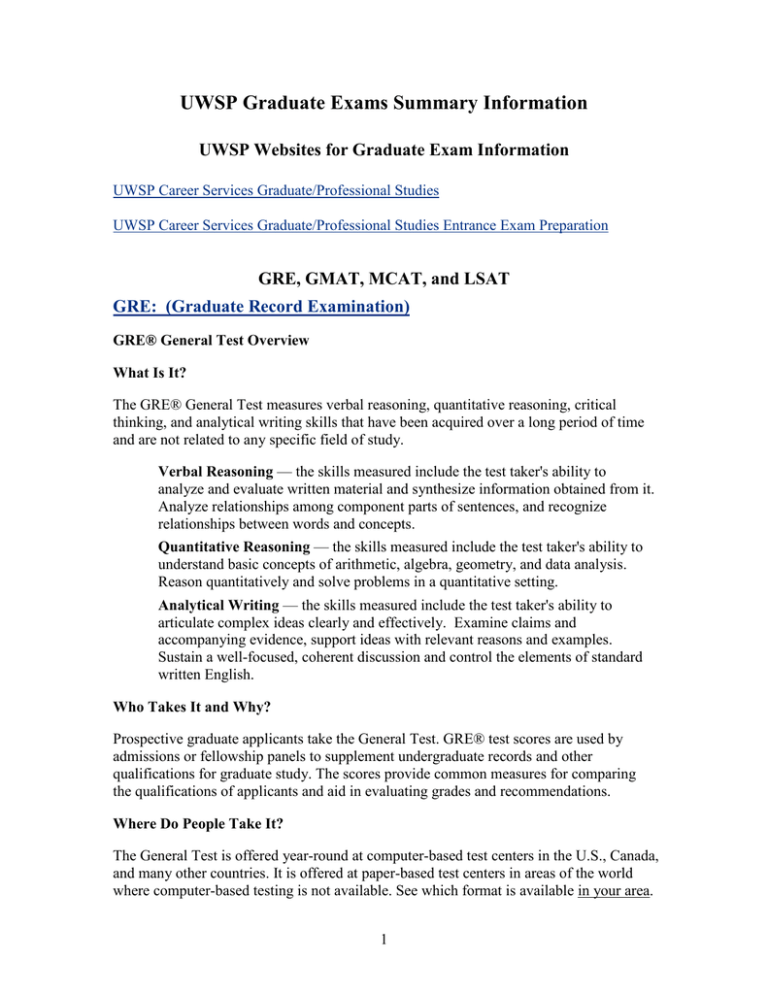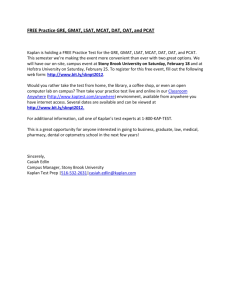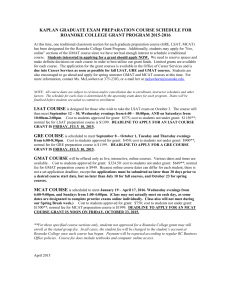UWSP Graduate Exams Summary Information UWSP Websites for Graduate Exam Information
advertisement

UWSP Graduate Exams Summary Information UWSP Websites for Graduate Exam Information UWSP Career Services Graduate/Professional Studies UWSP Career Services Graduate/Professional Studies Entrance Exam Preparation GRE, GMAT, MCAT, and LSAT GRE: (Graduate Record Examination) GRE® General Test Overview What Is It? The GRE® General Test measures verbal reasoning, quantitative reasoning, critical thinking, and analytical writing skills that have been acquired over a long period of time and are not related to any specific field of study. Verbal Reasoning — the skills measured include the test taker's ability to analyze and evaluate written material and synthesize information obtained from it. Analyze relationships among component parts of sentences, and recognize relationships between words and concepts. Quantitative Reasoning — the skills measured include the test taker's ability to understand basic concepts of arithmetic, algebra, geometry, and data analysis. Reason quantitatively and solve problems in a quantitative setting. Analytical Writing — the skills measured include the test taker's ability to articulate complex ideas clearly and effectively. Examine claims and accompanying evidence, support ideas with relevant reasons and examples. Sustain a well-focused, coherent discussion and control the elements of standard written English. Who Takes It and Why? Prospective graduate applicants take the General Test. GRE® test scores are used by admissions or fellowship panels to supplement undergraduate records and other qualifications for graduate study. The scores provide common measures for comparing the qualifications of applicants and aid in evaluating grades and recommendations. Where Do People Take It? The General Test is offered year-round at computer-based test centers in the U.S., Canada, and many other countries. It is offered at paper-based test centers in areas of the world where computer-based testing is not available. See which format is available in your area. 1 Who Accepts It? Any accredited graduate, business or professional school, or any department or division within a school, may require or recommend that its applicants take the General Test, a Subject Test, or both. If approved by the GRE® Board, a non-accredited institution can also receive test takers' scores. GMAT: (Business) What Is It? Your GMAT® scores are one measure of your potential for academic success in a graduate business program. Learn everything you need to know about them, including what they mean, how schools use them, and how to send them to the schools of your choice. MCAT: (Medicine) About the MCAT Exam The Medical College Admission Test (MCAT) is a standardized, multiple-choice examination designed to assess the examinee's problem solving, critical thinking, writing skills, and knowledge of science concepts and principles prerequisite to the study of medicine. Scores are reported in Verbal Reasoning, Physical Sciences, Writing Sample, and Biological Sciences. Medical colleges consider MCAT scores as part of their admission process. Almost all U.S. medical schools require applicants to submit MCAT scores. Many schools do not accept MCAT scores that are more than three years old. LSAT: (Law) About the LSAT The Law School Admission Test (LSAT) is a half-day standardized test required for admission to all ABA–approved law schools, most Canadian law schools, and many non– ABA–approved law schools. It provides a standard measure of acquired reading and verbal reasoning skills that law schools can use as one of several factors in assessing applicants. The test is administered four times a year at hundreds of locations around the world. Many law schools require that the LSAT be taken by December for admission the following fall. However, taking the test earlier—in June or October—is often advised. Some schools place greater weight than others on the LSAT; most law schools do evaluate your full range of credentials. 2 Test Format The test consists of five 35-minute sections of multiple-choice questions, in three different item types. Four of the five sections contribute to the test taker’s score. The unscored section, commonly referred to as the variable section, typically is used to pretest new test questions or to pre-equate new test forms. The placement of this section will vary. A 35-minute writing sample is administered at the end of the test. LSAC does not score the writing sample, but copies of the writing sample are sent to all law schools to which you apply. What the Test Measures The LSAT is designed to measure skills that are considered essential for success in law school: the reading and comprehension of complex texts with accuracy and insight; the organization and management of information and the ability to draw reasonable inferences from it; the ability to think critically; and the analysis and evaluation of the reasoning and arguments of others. The three multiple-choice question types in the LSAT are: 1. Reading Comprehension Questions These questions measure your ability to read, with understanding and insight, examples of lengthy and complex materials similar to those commonly encountered in law school work. The reading comprehension section contains four sets of reading questions, each consisting of a selection of reading material, followed by five to eight questions that test reading and reasoning abilities. 2. Analytical Reasoning Questions These questions are designed to measure your ability to understand a structure of relationships and to draw logical conclusions about that structure. You are asked to make deductions from a set of statements, rules, or conditions that describe relationships among entities such as persons, places, things, or events. They simulate the kinds of detailed analyses of relationships that a law student must perform in solving legal problems. 3. Logical Reasoning Questions These questions are designed to evaluate your ability to understand, analyze, criticize, and complete a variety of arguments. Each logical reasoning question requires you to read and comprehend a short passage, then answer one question about it. The questions test a variety of abilities involved in reasoning logically and thinking critically. 3



